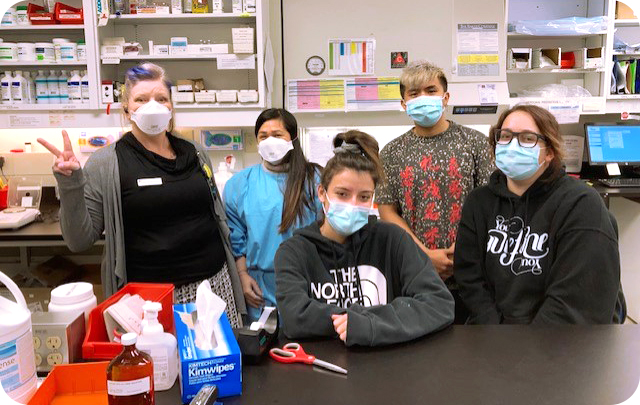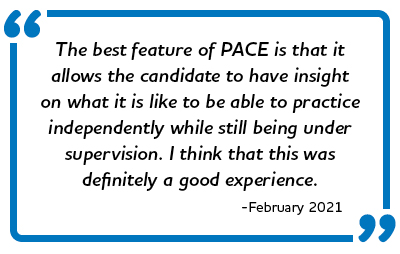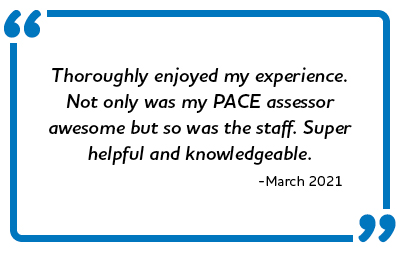Pictured above is Structured Practical Training preceptor Linda Ham (right) alongside her pharmacy colleagues.
Every year pharmacists and pharmacy technicians volunteer their time to serve as Practice Assessment of Competence at Entry (PACE) assessors and Structured Practical Training (SPT) preceptors. Their vital work ensures that new registrants meet the College’s practice-based requirements and can practice their profession in Ontario. The College expresses its appreciation to all these volunteers for their time, expertise and commitment to the pharmacy profession.
THE SPT EXPERIENCE FOR PHARMACY TECHNICIAN APPLICANTS
The Structured Practical Training (SPT) program for pharmacy technician applicants is a 12-week competency-based training program overseen by a College-trained preceptor. SPT focuses on preparing and measuring a candidate’s readiness to safely and effectively practise as a pharmacy technician.
In SPT, pharmacy technician applicants must apply what they learned in school to a real-world pharmacy setting by completing a series of activities under the guidance of their preceptor.
HELPING OTHERS SUCCEED
Bree Sensabaugh-Parker has been a SPT preceptor since 2015 and working non-stop with new pharmacy technician candidates at London’s Victoria Hospital and Children’s Hospital.
“It’s a rewarding role knowing that you’re helping others succeed as they begin their real-world experience,” says Sensabaugh-Parker. “I’ve built career-long relationships with former candidates who continue to look to me for guidance and I am proud to play a role in supporting safe, regulated pharmacy care in Ontario and setting others up for success.”

The majority of Sensabaugh-Parker’s SPT pharmacy technician applicants choose to continue their careers at Victoria Hospital and Children’s Hospital using the skills they learned during their placement and building on existing working relationships with staff.
Like her SPT pharmacy technician applicants, Sensabaugh-Parker continues to learn and grow in her role, and tailors her teachings for each candidate.
“The preceptor-preceptee is an important relationship,” says Sensabaugh-Parker. “Not everyone learns by the same method, so it’s important to be flexible in your teaching style to be able to explain things and encourage learnings in different ways. This could include extra reading, tactile assignments, or discussions. Being available for guidance is the key to a good working relationship.”
Fellow SPT preceptor Linda Ham echoes this sentiment. “I have learned how to be patient and how to change my teaching style depending on the candidate,” says Ham. “As each candidate learns differently, it’s important to check in regularly throughout their rotation to make sure they are on track—the outlined activities and timelines OCP provides supports this engagement.”
Ham works at a community pharmacy in the Greater Toronto Area and began her role as a preceptor in 2014. Since the pandemic began, Ham has supported two SPT candidates who became valuable resources in managing the extra services, including COVID-19 vaccines and testing, that were made available at Ham’s pharmacy.
While the pandemic heightened the demand on pharmacies, Ham leveraged this as a teaching opportunity by showing her candidates how to log COVID-19 vaccines into the COVAXon portal and how to support the flow of an increased number of patients.
“You can benefit a lot from the candidate being added to your workplace,” says Ham. “Whether it is educating patients on what services are provided such as asymptomatic rapid testing, COVID-19 vaccines and medication reviews or helping the pharmacy team manage lines for COVID-19 vaccination walk in clinics, the candidates play an important role in supporting these vital services.”
Like Sensabaugh-Parker, Ham speaks to the rewarding nature of being a SPT preceptor and the impact of the community.
“Serving as a preceptor further amplifies your role as a valuable member of the pharmacy community,” says Ham. “It’s a great opportunity to teach and spread your pharmacy practice knowledge and support the next generation of pharmacy technicians.”
Becoming a SPT Preceptor
If you are a pharmacy professional who is interested in becoming a SPT preceptor and meets the SPT Preceptor Criteria, please visit our SPT and SPT Preceptors web pages.
THE PACE EXPERIENCE FOR PHARMACIST APPLICANTS
The PACE model is an assessment-only evaluation of a pharmacist applicant’s entry-to-practice competency that is completed under the supervision of a PACE assessor. PACE assessors are frontline pharmacists who have undergone screening and training processes with the College. The assessor does not provide teaching or training during PACE, but rather measures a candidate’s practice-readiness as a pharmacist.
Each year the College invites candidates to provide anonymous feedback about the PACE program as part of its ongoing evaluation and assessment. Here’s what some candidates said about their experience:
Becoming a PACE Assessor
If you are a pharmacist who is interested in becoming a PACE assessor and meets the PACE Assessor Criteria, please visit our PACE and Information for Assessors web pages.
If you are a pharmacist who is interested in training future pharmacists to help them prepare for PACE, please consider becoming a PACE coaching pharmacist.



![“[My] PACE assessor…was the best part of my experience, along with her team! They were very professional, friendly and dedicated to provide the best patient care.” -April 2021](https://pharmacyconnection.ca/wp-content/uploads/2022/02/Thank-You-Quote-April.jpg)












